Facebook starts alerting users when they share old news
But, they can still share them

Just two days ago, Google announced a new tool to fact-check images and the context in which they were taken. Now, Facebook has come out a way to check misinformation by alerting users when they share an article that is more than 90 days old.
However, users would still be able to share such articles though it would clearly show up as old news to their circle of friends. In a blogpost, Facebook's VP of Feed and Stories, John Hegeman says this step followed months of research that showed timeliness of an article made a key difference to people when they read, trust and share content.
- Google adds fact-check to images
- Facebook will no longer offer its entry-level VR headset
- India's antitrust watchdog clears Jio Platforms-Facebook deal

To ensure people have the context they need to make informed decisions about what to share on Facebook, the notification screen will appear when people click the share button on articles older than 90 days, but will allow people to continue sharing if they decide an article is still relevant.
Publishers of news have repeatedly expressed concerns about older stories getting shared and raking up controversy on social media. A 2017 story of an Indian business house signing a deal with a Chinese company flooded Facebook a couple of days after the Sino-Indian border skirmish resulted in martyrdom of 20 Indian soldiers. This led to widespread condemnation of the government before people started to realize that the story in question was three years old.
In 2018, Facebook had added the context button which provided information about the news sources in a user's News Feed. This had considerably reduced the incidence of fake news spreading across the social media platform, though it did not stop users from pushing old and non-contextual content.
The rationale behind the move
"To ensure people have the context they need to make informed decisions about what to share on Facebook, the notification screen will appear when people click the share button on articles older than 90 days, but will allow people to continue sharing if they decide an article is still relevant," Hegeman said in the post.
In the coming months, the social media giant would also be testing other uses for the new notification screen. For posts carrying links around the Covid-19 pandemic, we are exploring similar notifications so that users move away to relevant information from more authoritative sources, he said.
Sign up for breaking news, reviews, opinion, top tech deals, and more.
“When we ask people what kind of news they want to see on Facebook, they continually tell us they want information that is timely and credible...Through providing more context, our goal is to make it easier for people to identify content that’s timely, reliable and most valuable to them," he said.